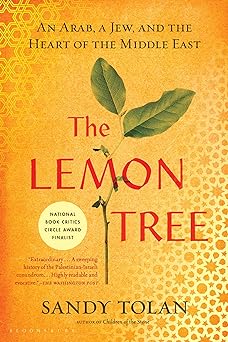More on this book
Community
Kindle Notes & Highlights
looking at the roots of the conflict.
"Our enemy is the only partner we have."
"to never again be led like sheep to the slaughter."
This was partly why she believed what she had been told:
The Israelis who placed these wreaths here were honoring what they called their War of Independence; to Bashir this same event was known as the Nakba, or "Catastrophe."
The British had arrived in 1917, the same year of the historic Balfour Declaration, in which England pledged to help establish a "national homeland for the Jewish people" in Palestine.
1935 Law for the Protection of German Blood and German Honor,
they cried out desperately for help, for pity, for water, for air, for a scrap of humanity."
I made the decision to do everything in my power to prevent the execution of a plan that was going to compromise Bulgaria in the eyes of the world and brand it with a mark of shame that it did not deserve."
"Bravo for your courage!"
It would inflict an undeserved stain on Bulgaria's honor. . . ."
Yet it is also true that at the critical time, ordinary people—in Kyustendil, in Plovdiv, in Sofia, across the country—stood by the Jews of Bulgaria. As a result, the Jewish population of an entire nation did not perish in the gas chambers at Treblinka.
"the fragility of goodness": the intricate, delicate, unforeseeable weave of human action and historical events.
to investigate the roots of the struggle for Palestine.
unified leadership
hidden interests of individual leaders
Why, they asked, should their homeland become the solution to the Jewish problem in Europe?
The future shape of Palestine, it was increasingly clear, would be determined by the facts on the ground, not by what the United Nations had put on paper.
"The boundaries of the state," Ben-Gurion wrote, "will not be determined by a U.N. resolution, but by the force of arms."
Lydda's mayor "alleged that he was on good terms with the Jews and proposed to defend the town by diplomacy."
townspeople, who had pooled their gold to buy bullets.
had come down to a word no one had dared speak: surrender.
ironed out the terms of surrender:
were being forced to leave their homes.
"land without people for a people without land."
about the dream of Palestine.
"The Sultan needs money and we need a homeland.
They felt betrayed by Glubb and by Abdullah.
"I have all the people of al-Ramla to take care of. Shall I bring them, too?"
except Christian Arabs, whom they permitted to remain.
that Israel had no intention of implementing Resolution 194 and that the United Nations had no power to enforce it.
His siblings and neighborhood children would find pieces of wood to fashion as guns and play "Arabs and Jews,"
it was clear that no government in the world was prepared to force Israel to accept the terms of the resolution guaranteeing the right of return.
"The Castle"; he considered it "the most beautiful house in Ramla."
"I appreciate your gift, but as a public servant I cannot accept it."
"He gave us a feeling that he believed in our future,"
For God to allow this to happen, she would recall thinking, is utterly unconscionable.
the creation of the state of Israel as a safe haven for the Jews.
Why, she wondered, would anyone leave so willingly?
"Of all people who should know how not to treat someone badly just because they are different.
Never again
"The Jews threaten us with war and we say to them, ahlan wa sahlan [you are welcome]. We are ready!"
solutions must be found without a military conflict.
Soviet ambassador to Egypt had paid a personal call to Nasser, waking the president to urge him not to go to war.
Palestinians could rely only on themselves to deliver their own justice.
"What is a PhD when we have no country?"
"I would rather be in prison in my own country than be a free man in exile. I would rather be dead."
"And that every step meant so much to them."
We didn't "leave" the house! You forced us out!
Finally I have opened a door that has so long been closed. Dalia would recall this moment as the beginning of her quest toward understanding.


